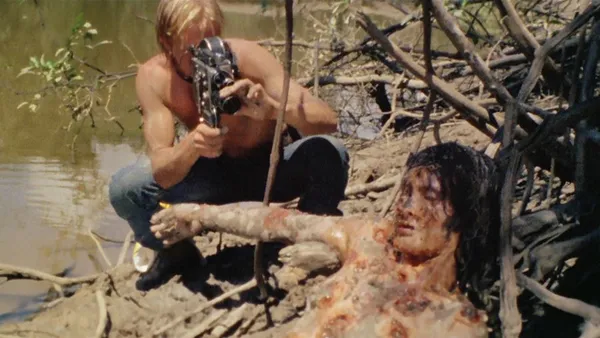Eye For Film >> Movies >> Cannibal Holocaust (1980) Film Review
Cannibal Holocaust
Reviewed by: David Graham

Something of a clumsy masterpiece, Ruggero Deodato's much-reviled shocker remains reprehensible in many ways but it genuinely carries a serious intent and its execution (pun intended) is endlessly intriguing. Finally available in the UK in almost uncut form (minus the first and perhaps only unnecessary scene of un-simulated animal cruelty), the most notorious of the 'video nasties' retains its raw power to disturb and upset, the found footage format and ingenious special effects infusing proceedings with a grimy sense of realism - Deodato even legendarily had to prove that his actors were still alive after Italian authorities believed this to be an actual snuff film. While the heavy-handed New York scenes framing the back-to-front narrative often fall flat and the dubbed acting is predictably variable, Cannibal Holocaust is an invigorating challenge that will buzz around your brain like the flies on its copious corpses, elevated to an unexpectedly jarring artiness by Riz Ortolani's haunting score.
Alan Yates' award-winning documentary crew has gone missing in the Amazonian 'Green Inferno', so renowned anthropologist Harold Monroe is called upon to locate the tribes they were seeking to film in hope of answers. With one of the Yacumo tribesmen as captive collateral, his guides Chaco and Miguel hope to ingratiate themselves with the fearsome warrior tribe, but it soon becomes apparent that the Americans before them have made a terrible mess. As the trio progress deeper into the jungle, they intervene in a tribal raid, which sees them welcomed hesitantly into the domain of the deadly tree-people the Yanomano. There they discover the film cans of the lost crew as well as evidence that they met a sticky end of their own doing, as Monroe comes to further understand when he reviews the shocking footage.

The meta-cinema layers of the film are immediately apparent with its opening news reports and segments of documentary footage that are later repeated from a different angle to remind us the importance of our own perspective. The dialogue may be labored - Deodato never lets us forget his deep mistrust of the media being the driving force behind making the film - but several insightful points about the hypocrisy of imperialism and our own perceived 'civilised' nature are made in the first reel. When the jungle action begins, we witness many horrifying events as frozen spectators along with the characters, unable to give away their position lest they incur the wrath of the tribes. The first truly upsetting scene involves a ritualistic rape and murder that's as gratuitous as it is compulsive, lent a truly tragic tone by Ortolani's uber-dark music.
For completists and gorehounds, it may well be disappointing to still be deprived of the early 'muskrat' snuff scene - and it arguably serves a potent narrative purpose, setting up the blurred line between reality and fiction as well as the savagery of the non-tribespeople - but the remainder of the film contains so much animal death that little of the impact is lost. The BBFC obviously now recognise that the executions - despite being staged and unnecessary - are in the other instances relatively humane and instant, with most of the animals becoming food for the cast and tribes afterwards, on-camera as well as off. Anyone who's killed a spider in their house or eaten a Chicken McNugget really should refrain from judging the film, especially when you consider the amount of similar activity in more highbrow films - whether it's Apocalypse Now or The Holy Mountain, or even less respected but never censored thrillers like Southern Comfort and Friday The 13th, the contentious issue and cheap tactic of animal slaughter may be off-limits to many viewers but its representation has an undoubted cinematic power.
As we meet the various tribes, it's impossible to ignore the glorious widescreen cinematography and stunningly authentic sets, while the camera takes in a veritable menagerie of jungle denizens to establish an atmosphere of constant elemental wonder as well as danger. The script often throws up brilliantly barbed truisms - Chaco chastises Monroe for trying to help their captive with the load they've burdened him with, reasoning that for all our modern medicine and knowledge he'll 'outlive all of us' - while the frequent ultra-violent set-pieces make it hard to tear your eyes from the screen. This first half of the film functions like a conventional adventure, laced with intrigue and never boring, but it's merely whetting the audience's appetite for the stomach-churning main course.
After Monroe is shown an example of Alan and co's methods that combines real footage of Cambodian atrocities with Deodato's staged executions, we learn that the deceased crew paid the soldiers to attain more sensational scenes, foreshadowing the horrific amorality of what is to come. With the projectionist commenting on the sloppiness of the first few reels in order to both distract from and remind us of the film's artifice, we descend along with Monroe deeper into the shaky, grainy footage of the crew's exploits, beginning with a sickeningly prolonged depiction of a very real and huge river turtle being decapitated, dissected and eaten. Deodato constantly blurs the lines between the real animal death and the fake human suffering, the special effects of the latter being so impressive as to be indistinguishable from the veracity of the former.
As the film progresses, we watch aghast along with Monroe and the TV producers who wish to sell this footage and present it to the public. Significantly, the only human violence we witness is for the most part perpetrated by the crew upon the tribes in a selfish bid for attention-grabbing footage (until their spectacularly gory comeuppance, that is). The rawness of the camerawork only adds to the intensity, while Ortolani's score rises and swells in order to both comment on the crew's antics as well as give us a sense of their own feelings; the more upbeat opening theme returns in jarring moments where the crew revel in the 'beautiful' carnage they've wrought. The Holocaust of the title has more meaning than might be expected, and the flippancy with which the characters exploit their subjects offers a damning indictment of film-makers' tactics (for some viewers Deodato's own will not be dissimilar).
With the tribes closing in on the characters, their prior excesses make it hard to care what happens to them, resulting in a distinct lack of suspense, but the overwhelming ferocity of the film keeps you riveted to your seat. Several later scenes of sexual violence are indulgently lengthy with only the thinnest of purpose, while the characters' determination to document everything flies in the face of common sense (as with all found footage genre flicks), but Deodato builds to a crescendo of fever-pitch horror that really leaves the viewer as rattled as the on-screen audience. The closing shot also throws in a couple of darkly subversive pieces of mise-en-scene; the camera pans past a truck emblazoned with what looks like one of the tribes' totems before rising to the sky past a sign for the Avenue of the Americas. Deodato's message - while hardly original or subtle - is harshly critical of the West's idea of 'progress' and 'civilisation', obviously feeling there is little to separate us from these tribes we feel so superior to.
Cannibal Holocaust is perhaps the ultimate example of a film that eats itself; it will be debated and misunderstood for years to come, but Deodato's underlying messages about media corruption and the danger of imperialism are astoundingly prescient and eternally relevant. Featuring a wealth of mind-searing imagery and anchored by some surprisingly effective acting from mirroring male leads Robert Kerman and Gabriel Yorke, it's as intimidating and hostile as its jungle setting, but also as deep and bountiful. If you're willing to take the journey into this cinematic Heart Of Darkness, you may well regret bearing witness to its objectionable moments, but has your lunch really had any better treatment?
Reviewed on: 13 Dec 2012

















